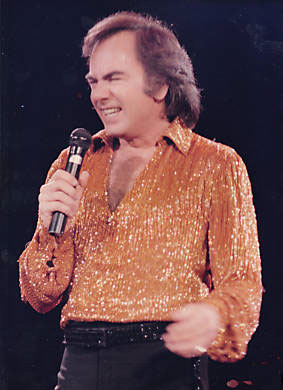As expected, I used more of my iTunes funds to dig up another relic from my youth, this time the 1980 album The Game by Queen. I originally had this on vinyl and I remember the album slip was very silver and shiny.
How does it rate on the Neil Diamond sparkle shirt scale 33 years later? Let’s find out.
Queen, The Game
“What I knew of Queen in 1980 consisted of a few hits, notably “We are the Champions” and “We Will Rock You”, both of which I found slightly annoying even while admitting they were effective arena/power-anthem songs. I was, however, a huge fan of their silly mini-epic “Bohemian Rhapsody” and played my sister’s 45 enough to get her peeved at me. This was back when media could actually wear out, so her reaction was not entirely inappropriate. She’d also had a lot of her vinyl trashed by being left out in the rain by one or both of my brothers during one of their infamous sibling battles so she was maybe more protective than usual about her music collection. But I digress. I liked the song and yet Queen was never really on my radar.
In 1980 the band released The Game which was the start of a new direction for the group, mainly through the introduction of synthesizers and an overall softer sound. I recall their next album, Hot Space, was condemned in one review as being “over-produced” and The Game was definitely the first step toward that. At the time I wasn’t aware of any of this, all I knew is that “Another One Bites the Dust” was catchy as all get-out and a huge hit and was followed by the equally catchy Elvis callback “Crazy Little Thing Called Love”, the video (pre-MTV) of which features the least convincing display of machismo ever:
http://www.youtube.com/watch?v=EE34cSvZCd8
With two solid radio hits I picked the album up and generally lurved it, though it falls into that curious collection of albums I really enjoyed and yet never purchased anything else from the same artist ever again. It remains the only Queen album I’ve ever bought.
Listening to it today some aspects are dated, mainly the way the synths are used, along with reverb and other sound effects. They mostly distract from the music, adding little to the songs.
The songs themselves cover a pleasing variety of styles in the span of a brisk 35 minutes. “Don’t Try Suicide” may still be the catchiest yet most cynical anti-suicide song ever, with lyrics like “Don’t try suicide, nobody cares/Don’t try suicide, nobody gives a damn”. “Rock it (Prime Jive)” features drummer Roger Taylor’s weird growling vocals and Brian May provides an appropriately smooth voice for his ballad “Sail Away Sweet Sister”. The focus remains on Freddie Mercury and he struts through the rest of the tracks with the confidence of a veteran performer (The Game was Queen’s eighth album). There are really no bad songs on the album, though “Rock It” comes across lyrically as a bit inane (Taylor also wrote “Radio Ga Ga”).
While at times a bit dated and dotted with unnecessary flourishes, The Game remains a strong testament to the talent of Queen. I can listen to it now and separate it completely from my time in high school when I originally bought it, which speaks to the overall quality of the music.
Rating:
8/10 Neil Diamond sparkle shirts



